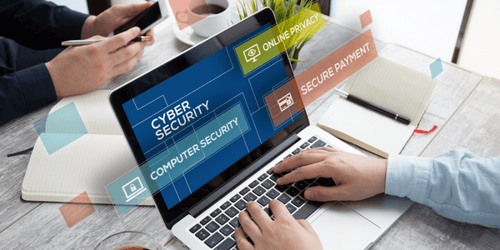According to a recent report, Australia is the 4th most targeted country in the world when it comes to banking app malware, with 34 of the country’s banking apps under attack from malicious trojans in 2022. But banks are not alone: most Australian businesses reported a surge of email cyberattacks in 2021, underlining the vulnerability of Australia’s corporate sector to the threat of cyberattacks. Read on for more on this as well as tips to help keep you and your business safe online.

A surge of cyberattacks
Data released by cyber security software company Trend Micro shows Australia is facing a mounting number of cyber risks. In 2021 alone, Australian businesses recorded nearly 33.6 million cloud email threats, up by a whopping 101 per cent on the previous year. Even more concerning is that nearly half of all businesses don’t believe they can adequately assess risk exposure to future cyberattacks.
Technical director at Trend Micro, Mick McCluney, said each year innovation in the threat landscape evolves, and businesses’ best shot at mitigating risks is by delivering streamlined prevention, detection and response without limits.
“Email is an integral cog in the digital transformation machine. Cybercriminals worked overtime to attach malware in malicious emails in 2021 using advanced tactics and social engineering lures.”
Three of Australia’s big four banks have also been hit hard by trojan malware in 2022, a concern for users of those apps who may be at higher risk of having their financial information stolen. With malware reportedly getting more aggressive and more advanced, it’s evident that banking institutions – indeed all businesses – need to do more to protect customers from malware.
Cyber Safety Tips
Cyber criminals have used the pandemic as an opportunity to increase their efforts, exploiting the vulnerability of those working from home. As a result, we’ve seen a significant increase in the number of phishing attacks.
Here are some guidelines to help protect you from identity theft, malware and other cybersecurity threats.
- Set privacy settings to private so that personal data is not visible on social media.
- When signing up to new social networks or emails accounts, keep personal identifying information out of usernames and email addresses, such as your year of birth, phone number, or age.
- Enable two-factor authentication if available.
- Keep your anti-virus software up to date.
- Use unique and strong passwords and have a different password for each account. A password manager like Last Pass can help you generate strong passwords and keep track of passwords.
- Avoid using public Wi-Fi and if you do have to use it, don’t access it for online banking or anything that could put you at financial risk if personal information is criminally obtained.
- Clear your cache regularly including cookies, search engine activity and browsing history so that personal data is not stored on your web browser.
- Look for secure websites when buying online to ensure your credit card, bank account, address and phone number are protected. Look for the HTTPS at the beginning of a website address.
- Be aware of click bait. Phishing emails often ask you to download a file or open a link that can infect your computer with malware. Learn to recognize the warning signs of scams and practice smart clicking.
For more information about staying safe online, refer to the cyber.gov.au website.
While all care has been taken in the preparation of this publication, no warranty is given as to the accuracy of the information and no responsibility is taken by Finservice Pty Ltd (Mortgage Express) for any errors or omissions. This publication does not constitute personalised financial advice. It may not be relevant to individual circumstances. Nothing in this publication is, or should be taken as, an offer, invitation, or recommendation to buy, sell, or retain any investment in or make any deposit with any person. You should seek professional advice before taking any action in relation to the matters dealt within this publication. A Disclosure Statement is available on request and free of charge.
Finservice Pty Ltd (Mortgage Express) is authorised as a corporate credit representative (Corporate Credit Representative Number 397386) to engage in credit activities on behalf of BLSSA Pty Ltd (Australian Credit Licence number 391237) ACN 123 600 000 | Full member of MFAA | Member of Australian Financial Complaints Authority (AFCA) | Member of Choice Aggregation Services.





